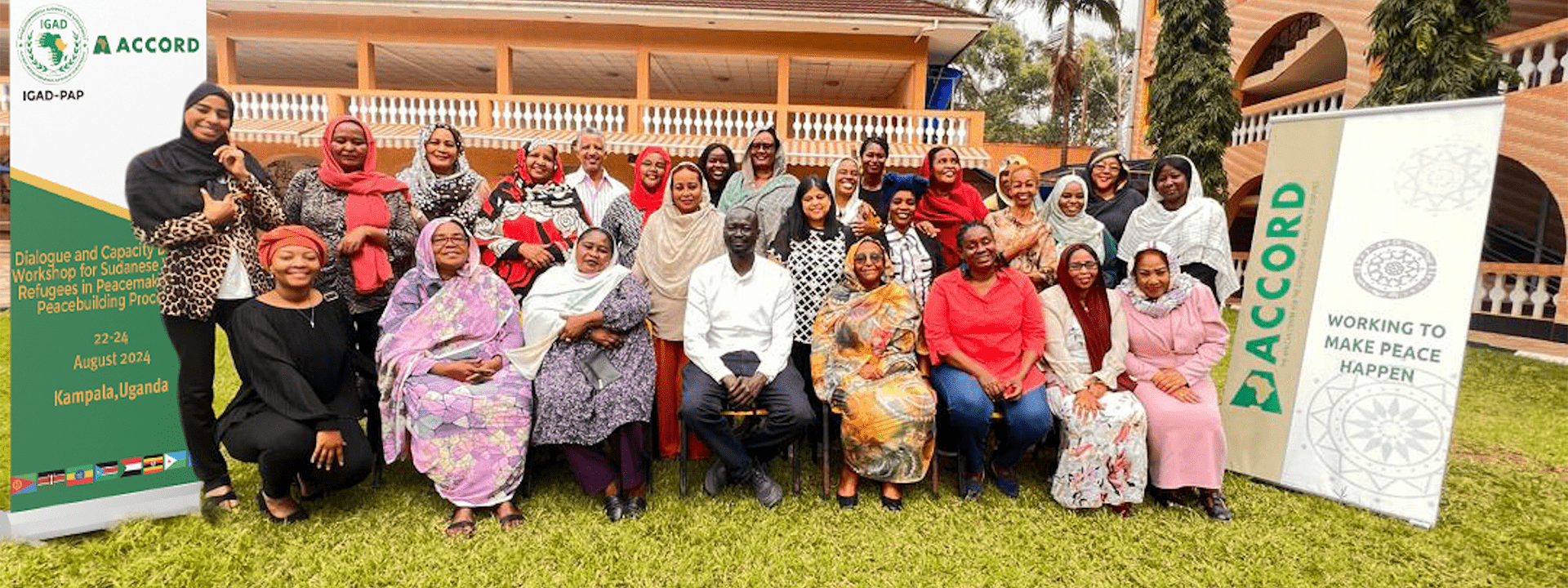August 24, 2024, (KAMPALA-Uganda): The Political Affairs Mediation and Peace Building (PAP) of the Intergovernmental Authority on development(IGAD) in partnership with the African Centre for the Constructive Resolution of Disputes(ACCORD), concluded a dialogue and capacity building workshop for Sudanese women refugees in Peace-making and peace building processes. This workshop brought women from Sudan leading different organizations. The main aim of this workshop is to equip Sudanese women refugees with the necessary skills to advocate for inclusion in mediation, conflict resolution and dialogue.
Workshop started with opening remarks from the head of PAP Dr. Aleu Garang who shared IGAD’s vision of replicating this workshop model across other IGAD member states, including South Sudan, Kenya, and Ethiopia. He stressed the importance of capacity-building initiatives like this one in empowering women and marginalized groups to actively participate in peace building efforts. Dr. Garang also took the opportunity to clarify IGAD’s comprehensive mandate, pointing out that while the organization is often recognized for its work in locust disease control, its role extends far beyond, encompassing a wide range of peace building and development activities across the region.
Marisha Ramdeen, of ACCORD set the tone by introducing ACCORD and its extensive work across the region. She emphasized ACCORD’s dedication to conflict resolution and peace building, particularly in Sudan, where the organization has been actively engaged in fostering dialogue and collaboration among various stakeholders. Marisha highlighted ACCORD’s strategic partnership with IGAD, particularly in addressing Sudanese issues, which underscored the significance of this workshop in contributing to broader regional peace efforts.
The opening session set a collaborative and forward-looking tone for the workshop, with both speakers underscoring the critical role of regional cooperation and capacity-building in achieving lasting peace and stability.
With guidance from the facilitator, the sessions dived into discussions such as “Understanding the Geo-Political Dynamics of the War in Sudan ,Understanding the Contextual Analysis: Political, Security, Humanitarian, Economic-Socio-Cultural Aspects and Transformative Scenario Planning for the Geneva Peace Talks on Sudan” these conversations lead to identification of some challenges including; Limited Authority and Opportunities, Financial Constraints, Lack of Training and Capacity, Covert Lobbying, Signing of Protocols, Late Inclusion and Lack of Political Will. It is from this realization that the Participants emphasised the importance of unity among women across different tracks and the need for a unified voice; Concerns were raised about who decides on women’s representation in peace processes and the need for well-versed representatives; The need for creating spaces for conversations between women in civil society and political spaces to bridge knowledge gaps and the importance of documentation and learning from past experiences was highlighted.
Participants engaged in transformative scenario planning, considering various potential outcomes for the Geneva Peace Talks, including scenarios of success, failure, and suspension. Each scenario was analysed across political, humanitarian, economic, security, and social dimensions. Therefore they identified three key points as a way forward: Advanced Training: Negotiation skills, advocacy, and media strategy development. Women’s Agenda Conference: Bringing together women from RSF, SAF, and other political and armed groups around a common agenda. Exchange Programs: Collaboration with South Sudanese women and women from other similar contexts.
In conclusion, the participants agreed to create their own reports and cascade the information learned to their respective coalitions, networks, and organizations.
This workshop was organised by the political Affairs and peace building Unit of the Intergovernmental Authority on Development (GAD-PAP) with financial support from The African Centre for the Constructive Resolution of Disputes (ACCORD).

